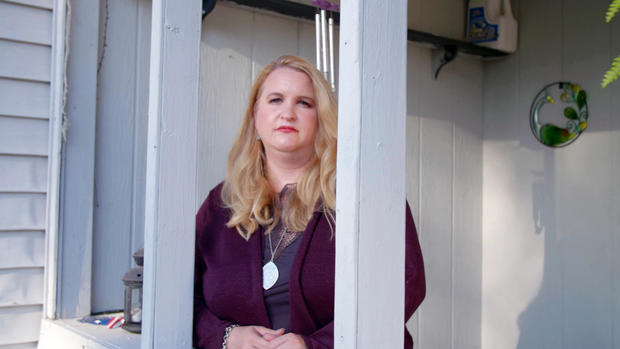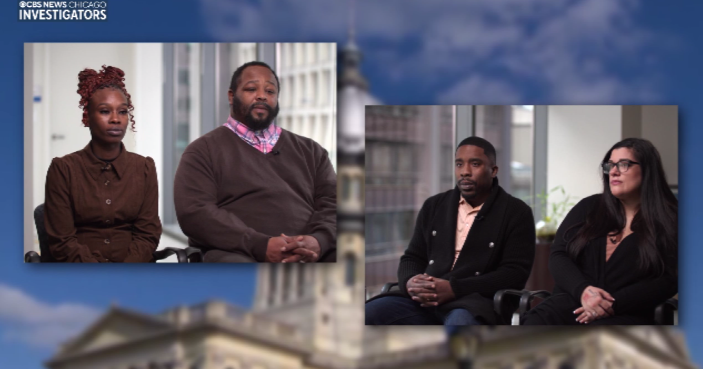Campaign to end child marriage in the U.S. runs into some surprising opposition
Watch the CBSN Originals documentary, "Speaking Frankly: Child Marriage," in the video player above.
Genevieve Meyer was just 15 years old when her 42-year-old neighbor put his hand on her thigh. She knew at the time that it didn't make sense — he was more than twice her age and had already been married a couple of times. But the man was persistent, complimenting her long blond hair and pointing out that she looked much older than her age. "It just progressed into more inappropriate behavior," she said.
It wasn't long before her mother took notice. She called the cops and claimed that the older man was assaulting Meyer. The police arrested him. But he managed to make bail.
That's when her mother, who Meyer said suffered from mental illness, had a sudden change of heart.
"My mom told me that this was my fault," explained Meyer, who is now 39. She reasoned that Meyer had seduced the man. If they didn't fix the situation, he could lose his job, his children, and spend the next decade of his life in jail. In California, where Meyer lived at the time, sex with anyone under the age of 18 constitutes statutory rape, regardless of whether or not the younger party has consented.
But her mother saw a solution: "She suggested we get married." Doing so would render the relationship legal, allowing her neighbor to avoid statutory rape or child sexual abuse charges. While sex between an adult and a minor is a crime, marriage would make the same activity legal. It would also rid Meyer's mother of the responsibilities of parenting.
"I didn't really believe that I could get married at my age," said Meyer. But within a month, on May 11, 1995, she wed her neighbor and charges against him were dropped.
Across the country, more than 200,000 minors were married between 2000 and 2015, according to marriage records obtained from 41 states. In the United States, marriage laws are regulated at the state level. Forty-eight states still have legal loopholes that allow youth under the age of 18 to marry. Those exceptions include youth with legal emancipation, parental consent or judicial approval. In many instances these loopholes are used for the older partner to avoid statutory rape charges.
In 87% of child marriages, the minor is a girl; 86% of the time she is marrying a legal adult. Based on these numbers, advocates argue that the vast majority of marriages with minors would otherwise constitute statutory rape.
"In 38 states, what would otherwise be considered felony rape becomes completely legal once a marriage license is handed out," said Fraidy Reiss, the founder and executive director of Unchained at Last, an advocacy group dedicated to ending forced and child marriage in the United States. Sexual predators have an incentive to marry their victims in order to avoid prosecution and possible jail time. "We're creating a mockery of statutory rape laws," Reiss said.
The laws on both the legal age of marriage and statutory rape vary by state. In California, where Meyer lived, there was no minimum age required for marriage, meaning a child of any age could wed provided they had parental approval and sign-off from a judge. In Meyer's case, the latter proved a challenge. "It took some effort to state-shop and figure out which states it could happen in," said Meyer. Eventually she travelled with her soon-to-be husband to Mississippi, where the courts didn't object.
California has since amended its laws. In 2017, state Senator Jerry Hill, a Democrat, introduced legislation to ban marriage under 18 without exception.
But he was met by opposition, surprisingly, from groups traditionally associated with the left. The ACLU Northern California chapters, along with the Children's Law Center of California, opposed the bill, claiming estimates of the scale of the problem were overblown. They cited Los Angeles County, where just 44 petitions for marriage by a minor we made in 2017 out of a population of 10 million. The groups argued that the new law would strip youth of their right to form their families and eliminate one of the only pathways to exit the foster care system through emancipation.
A version of the legislation eventually passed, but without any age restrictions. While there are stricter protocols for court oversight, a minor of any age can still marry in California.
There is a federal law stating that if one party is under age 16, and the parties are four years apart in age, then a sex offense has occurred. "It's not called statutory rape, but that's effectively what it is," explained Jeanne Smoot, senior counsel for policy and strategy at the Tahirih Justice Center. But for the law to be enforced the crime must occur where federal criminal jurisdiction applies, such as in the case of the Jeffrey Epstein, who was arrested earlier this year on federal charges for sex trafficking of minors in Florida and New York. (Epstein died behind bars in August.)
Advocates argue that the only way to end the statutory rape loophole is to end child marriage in all 50 states. Changes to state laws governing marriage across the country have been remarkably swift. Last year Delaware became the first state to completely ban marriage under the age of 18, without exception. New Jersey followed shortly thereafter. In total, eight states have raised the age of marriage to legal adulthood, either requiring couples to be at least 18 at the time of the wedding or to be emancipated minors — a complex process where the courts recognize a minor as a legal adult based on evidence that they can support themselves without their former legal guardian.
Today, Genevieve Meyer lives in Indiana, where she is working hard to change the laws in the state. Currently, Indiana allows minors as young as 15 to get married, provided they have parental approval and judicial consent. Meyer wants to see that practice come to an end.
"You know, most parents make good decisions when they come to their kids. They nurture them, they provide them with what they need, they enrich their lives, they want the best for them. But that's not the case for all parents, so we need to have laws in place to protect children when their parents don't — not loopholes for them to be exploited."




